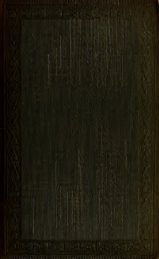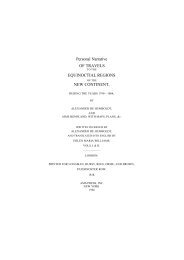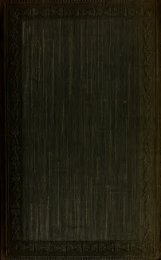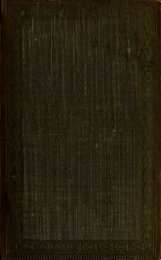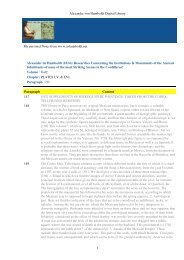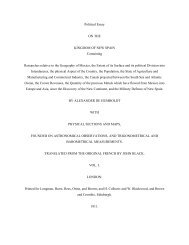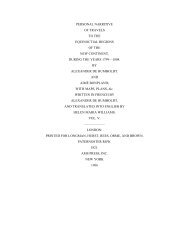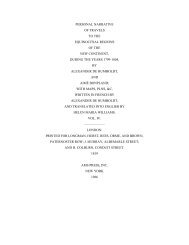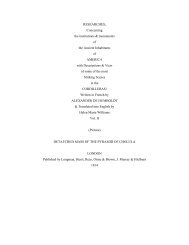See the complete document here
See the complete document here
See the complete document here
Create successful ePaper yourself
Turn your PDF publications into a flip-book with our unique Google optimized e-Paper software.
Bcription of physical phenomena, 68-<br />
71.<br />
uanaiy Islands, regardod by Don Fernando,<br />
son of Columbus, as <strong>the</strong> Cassiteri-<br />
NDEX.<br />
133, 134 ; early notices of, 134, 135.<br />
Caravan trade of <strong>the</strong> Phcenicians, 130 of<br />
;<br />
Western Asia, 170, 171 ; Egypt, 171, 172.<br />
Cardanus, Hieronyuius, wi-itings of, 260,<br />
261.<br />
Carthage, its geographical site, 120 nav-<br />
;<br />
igation, 132 ; greatness, 149. <strong>See</strong> Phoenicians.<br />
Carus on <strong>the</strong> tone of mind awakened by<br />
landscape, 89.<br />
Chinese expedition to,<br />
Caspian Sea, 145 ;<br />
163.<br />
Cassini, Dominicus. his observations on<br />
Saturn's ring, 323, 329 zodiacal ; light,<br />
329.<br />
Cassius, Mount, <strong>the</strong> probable " amber<br />
coast" of <strong>the</strong> Phoenicians, 130.<br />
Castilian heroic ages, impulses of, 65.<br />
Castor, Antonius, botanical gardens of.<br />
195.<br />
Catlin on <strong>the</strong> language and descent of <strong>the</strong><br />
Indian tribe of <strong>the</strong>Tuscaroras, 236.<br />
Caucasus, Grecian myths respecting, 144.<br />
Celto-Irish poems, 48.<br />
Cervantes, his Don Quixote and Galatea,<br />
68, 71.<br />
Chseremon, his remarkable love of nature<br />
compared by Sir William Jones to that<br />
of <strong>the</strong> Indian poets, 28.<br />
Chaldean astronomers and ma<strong>the</strong>maticians,<br />
167, 177.<br />
Charlemasne, " Arabian presents sent to,<br />
220<br />
Charles V., letter to Cortez, 270.<br />
Chateaubriand, Auguste de, 75-77.<br />
Chemistry, pneumatic, dawn of, 344-346 ;<br />
chemical knowledee of <strong>the</strong> Romans,<br />
194 of <strong>the</strong> ; Arabs, 211. 212, 217, 218.<br />
Childrey, first observed <strong>the</strong> zodiacal light,<br />
329.<br />
Chinese, <strong>the</strong>ir pleasure gardens, and passages<br />
from <strong>the</strong>ir writers on <strong>the</strong> subject,<br />
103-105 ; antiquity of <strong>the</strong>ir chronology,<br />
114, 115 ; warlike expedition to <strong>the</strong> Caspian,<br />
186 ; Roman embassy to China,<br />
187; early use of <strong>the</strong> magnetic needle,<br />
191, 253; of movable types in printing,<br />
249.<br />
Chivalric poetry of <strong>the</strong> thirteenth century,<br />
46.<br />
Christianity, results of its diffusion in <strong>the</strong><br />
expansion of <strong>the</strong> views of men, in <strong>the</strong>ir<br />
communion with nature, 38, 39 its hu-<br />
;<br />
nianization of nations, 199.<br />
Chrysostom, his eloquent admiration of<br />
nature, 43.<br />
Cicero on <strong>the</strong> golden flow of Aristotly's<br />
eloquence, 29; his keen susceptibility<br />
for <strong>the</strong> beauties of nature, 31, 32 ; on<br />
<strong>the</strong> ennobling results of its contemplation,<br />
197, 198.<br />
Clmento, Accademia del, scientific re-<br />
searches of, 337-343.<br />
Ci'dUzation, early centers of, 115, 117, 12^J.<br />
35<br />
Classical literature, why so termed, 180 ,<br />
influence of its revival on <strong>the</strong> contem-<br />
des of <strong>the</strong> Carthaginians, 132, 133 ; supposed<br />
"happy islands" of <strong>the</strong> anci*^nts,<br />
plation of nature, 248, 249.<br />
Claude Lorraine, his landscapes, 89, 96.<br />
Claudian, quotation from, on <strong>the</strong> dominion<br />
of <strong>the</strong> Romans, 198.<br />
Colfeus of Samos, his passage through <strong>the</strong><br />
Pillars of Hercules into <strong>the</strong> Western<br />
Ocean, 150, 151, 152.<br />
Colchis,<br />
145.<br />
Argonautic expedition to, 144,<br />
Colebrooke on <strong>the</strong> epochs of <strong>the</strong> Indian<br />
on <strong>the</strong> incense of<br />
ma<strong>the</strong>maticians, 187 ;<br />
Arabia, 204, 205 ; Arabic translation of<br />
Diophantus, 224.<br />
Colonna, Vittona, her poems, 64.<br />
Columbus, peculiar charm lent to his de<br />
lineations of nature, 65 <strong>the</strong>ir ; religious<br />
and sim-<br />
sentiment, 65 ; <strong>the</strong>ir beauty<br />
plicity, 66; his acute and discriminating<br />
observation of nature, 66, 67; his dream<br />
letter to<br />
on <strong>the</strong> shore of Veragua, 67 ;<br />
Queen Isabella, 78 ; on <strong>the</strong> land of<br />
Ophir, 138 ; visit to Iceland, 238 died<br />
;<br />
in <strong>the</strong> belief that <strong>the</strong> lands discovered<br />
in America were portions of Eastera<br />
Asia, 239, 264, 265 made use of <strong>the</strong><br />
;<br />
writings of Cardinal Alliacus, 247, 251 ;<br />
his letter to Ferdinand and Isabella, on<br />
<strong>the</strong> coast of Veragua, 251 ; on his knowledge<br />
of <strong>the</strong> loe, 257 scientific charac-<br />
;<br />
teristics, 263, 264, 274 ; erroneous views<br />
on <strong>the</strong> extent of <strong>the</strong> Old Continent, 267-<br />
269 heraldic ; bearings bestowed on,<br />
270 ; physical observations in his letter<br />
from Haiti, October, 1498, 276 discov-<br />
;<br />
ery of <strong>the</strong> magnetic line of no variation,<br />
278, 279 first described <strong>the</strong> ; equatorial<br />
current, 283, 284 ; <strong>the</strong> Mar de Sargasso.<br />
285 ;<br />
on <strong>the</strong> method of taking a ship's<br />
reckoning, 293, 294.<br />
Compass, its discovery and employment,<br />
253-255 ; transmission through <strong>the</strong><br />
Arabs to Europe from <strong>the</strong> Chinese,<br />
253-255.<br />
Conquista, asre of <strong>the</strong>, great events it embraced,<br />
296.<br />
Conquistadores, impulses which animated<br />
<strong>the</strong>m, 271.<br />
Copernicus, 301; greatness of his epoch,<br />
303 his life and ; studies, 304, 305 ; grandeur<br />
of his views, and boldness of his<br />
teaching, 305-308 his ; eloquent description<br />
of his system, 307, 308 knowl<br />
;<br />
edge of <strong>the</strong> ideas of <strong>the</strong> ancients on <strong>the</strong><br />
structure of <strong>the</strong> universe, 310, 311.<br />
Cortenovis, Fa<strong>the</strong>r Angelo. story related<br />
by, on <strong>the</strong> tomb of Lars Porsena, 139,<br />
140.<br />
Cortez, Hernan, expeditions of, 270, 271,<br />
296.<br />
Cosa, Juan de la, map of <strong>the</strong> world, 263,<br />
265 298.<br />
Cosm'as Indicopleustes. 188. 189, 272.<br />
Cosmos, its science and history discriminated,<br />
106, 108.<br />
Coupvent an(\ Dumoulin on <strong>the</strong> height<br />
of <strong>the</strong> Peak of Teneriffe, 3 35.<br />
Oovilham, Pedro de, and Alonso de Pavya<br />
embassy to Prester John, 1252



